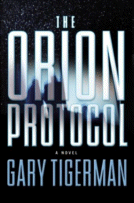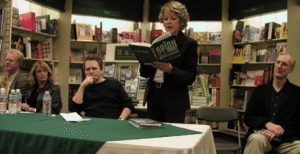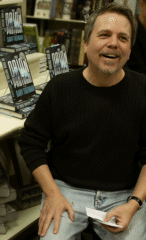A Conversation With Gary Tigerman
by Claire E. White
Gary Richard Tigerman grew up in California's San Fernando

|
A college drop-out, Gary found work as an actor playing teenage roles in movies and in TV series like Room 222 and Dragnet, including a stint as "Oggo the Cave Boy" in the hit science fiction series Lost In Space. In protest of the Vietnam war, he applied for recognition as a conscientious objector, but ultimately was forced to refuse induction. The Supreme Court split 5-4 against taking up his case, which landed Gary in jail. When NASA came to the Arizona work camp where he was serving his time, Gary jumped at the chance to participate in a zero-G study at the Presidio in San Francisco. After a year and a day, he was a free man. But he never forgot the kindness of the recruiters from NASA.
Gary got serious about writing songs after prison, becoming a staff song writer at Warner/Tamerlane, and performing on Saturday Night Live. Taking a break from professional struggles, he studied Buddhism and poetry with Allen Ginsberg in Colorado at Naropa Institute's Jack Kerouac School for Disembodied Poetics.
Continuing his Buddhist studies back in L.A., Gary met and married Wendy Cohen Ferraris. Despite Leon Redbone recording a chart single of Gary's tune "Seduced", winning awards and making good money writing jingles, and having songs covered by legendary blues band Canned Heat; Gary wasn't satisfied with his success as a songwriter -- he had been bitten hard by the screenwriting bug. Having a fondness for NASA and a great interest in the space program, Gary began writing a film project about two astronauts who see something on the last manned moon mission that the U.S. government suppresses. The late NBC legend Brandon Tartikoff read the story and saw it as both a book and a movie. That story eventually became The Orion Protocol, Gary's exciting new thriller which was just published by William Morrow. Richard Dreyfuss' production company has optioned the film rights to the book.
The Orion Protocol is a spellbinding thriller about what U.S. astronauts have known for years and what the government is determined to keep hidden from the public. When science journalist Angela Browning receives a mysterious package which contains authentic photos from a Mars Observer probe which NASA claimed was lost over ten years ago, events are set in motion which will affect everyone on the planet -- unless the people who want the secret kept can stop Angela and astronaut Jake Deaver from revealing the truth about the real reason there hasn't been a manned flight to the Moon since 1972. Gary weaves well-documented facts with fictional elements to create a spectacular story which could easily be ripped from today's headlines.
Gary lives in Los Angeles with his wife Wendy, a creative director in advertising, and their son Gabe. Gary talked with us about his journey from child actor to new novelist, the true facts behind The Orion Protocol and why manned space flight is more important now for humanity than it's ever been.
What did you like to read when you were growing up?
Oh, I'd say Ray Bradbury, Robert Heinlein, and Arthur C. Clarke were my first heroes. Sci-fi was the first thing to really fire my imagination, so much that after my folks went to bed, I remember sneaking into the bathroom when I was about 10 years old and reading The Martian Chronicles by the nightlight.
How did you get interested in acting? What did you enjoy most about acting?
I wandered into theater class in Granada Hills High School when I needed an elective and somebody told me it was an "easy B". The drama teacher, James Rawley, was a great, wise, and incredibly tolerant character who seemed to bring out the "inner clown" in all of us. Doing sketch comedy for weekly shows in Rawley's class, with the addictive thrill of hearing 100 kids laugh and applaud, became a reason to exist, and drama class was a refuge. We all forged notes and cut Phys. Ed to rehearse our shows. It was great. Robert Englund, who later became Nightmare On Elm Street's "Freddy Kreuger", was part of that group and he and I actually performed together in a Dracula satire for the whole school that's still right up there with the top ten most fun experiences I've ever had. I tried college theater, but I was too impatient and eventually just dropped out, got a theatrical agent, and started working.
How did you first get interested in writing? Was there anyone who encouraged or inspired you to develop your fiction writing talents?
| "As far as the dangers inherent in human space exploration, I just think people don't think the space shuttle is doing anything important enough to risk lives for. I think people would absolutely accept the risks of a manned mission to Mars, though." |
What attracted you first to Buddhism? How has your study of Buddhism affected your outlook on life?
I studied at the Naropa Institute and the "Jack Kerouac School of Disembodied Poetics" in Boulder, Colorado. Allen Ginsberg was my teacher for a summer and we read Walt Whitman and wrote poems. Ginsberg was a Buddhist student of Chogyam Trungpa Rinpoche, a Tibetan lineage-holder and teacher whose book Cutting Through Spiritual Materialism had really inspired me. Trungpa's clarity and insight into how our minds work was profound. So, I took a meditation class with Rinpoche and when I came home to L.A., I started doing sitting practice at a Tibetan Buddhist Dharmadhatu which is where I met my wife, Wendy, who was a very experienced practitioner and teacher there.
I think Buddhist teaching and sitting practice helped me become just aware enough of my own ego's relentless machinations to have a better sense of humor about being a human. Buddhism is tough. I haven't formally practiced for several years, but there's a kind of seeing-things-as-they-are that I experienced a lot when I was studying and sitting, which has stuck with me.
I'd like to talk about The Orion Protocol. Tell us about your road to publication: did you first envision the story as a feature film or did you originally see it as a novel? How did this book come about?

|
The publisher was politely wary, presuming that I would need help from somebody they would bring in with way more experience (which is understandable, since I had never written a book before). Now, ordinarily I enjoy collaboration: It's more fun and less lonely and you get more accomplished. But there was just something imperative for me about being the sole author of this work. I just needed to do this. So, I beat out a detailed outline, which the publisher approved, then I gave them the first hundred pages, at which point they finally called my William Morris agent, Matt Bialer, and agreed to do a book deal. Thus began what became a 6-year odyssey, set in motion by Dreyfuss and the enthusiasm of Brandon Tartikoff, who unfortunately did not live long enough to see the Orion Protocol get published.
Angela Browning, the science journalist who stumbles onto the story of a lifetime, is a fascinating character: she has a great sense of humor and is almost fearless. How did you create the character of Angela? What was the biggest challenge in creating her? Was there anything you were particularly trying to avoid with her?
My only model for a female science journalist is Emmy award-winning Linda Moulton Howe. She's very smart, graceful, and cuts to the chase. But Angela is not Linda. Angela seemed ready to rock very early on; her voice was very clear in my head. The primary challenge with her was to find the right balance between how much she drives the story and how much is carried by Jake and Augie, our two astronaut heroes. I was also concerned about how to handle the age difference between Angela and Jake so that any chemistry between them would be credible.
Former astronaut Jake Deaver is another interesting character; he's a man who has been scarred by his refusal to go along with the powers that be to achieve goals that he didn't agree with. How much of Gary Tigerman is there in the character of Jake?
Yeah, of the two Apollo alumni, Jake's the one I feel most at-home with. I definitely had my own run-in with the powers-that-be during the Nixon administration. Under the now-expired draft laws, when you refuse induction it's a federal crime. So, when the Attorney General of the U.S. sends you an indictment titled "United States of America versus Gary Tigerman", it has an impact. I wound up in a Federal prison in Arizona for opposing the war in Viet Nam. It was the only choice that made sense for me. I like to think Jake would have respected it.
How did you approach the research necessary for this kind of book?
 Ed Begley, Jr., Harley Jane Kozak, Gary Tigerman, Julie Cobb and James Cromwell at the launch party for The Orion Protocol at Brentano's in Century City, Los Angeles. |
What was the most challenging aspect of writing The Orion Protocol?
Shifting gears from what's required in screenwriting (brevity of description, simplified vocabulary, etc.) to getting my legs and feeling comfortable with my own "voice" in writing fiction -- that was the greatest challenge. Once I got it, I then had to keep going back and forth between drafts of the book and writing what were now adaptations of the book to the screen, which was also a learning experience. I wanted the film version to be strongly consonant with the book, and I wanted the book to be cinematic.
One theme in the book is that the government policy of deliberately withholding from the public any evidence of extraterrestrial life. Do you personally believe that our government has withheld such information from the public?
Oh, yeah.
Another theme in the book is the gradual leaching of power from the executive branch of the U.S. government. Do you believe this is happening today in our country?
| "America is more endangered by people's indifference to politics-as-usual and the self-interested machinations of corporate giants than by any band of terrorists you could name." |
At the end of the book is a fascinating list of true facts which are used in the book, including President Jimmy Carter's request that the Vatican turn over documents in its possession in the Vatican Archives relating to UFOs and extraterrestrial encounters going back hundreds of years. What do you think that the Vatican has in its possession that it refused to turn over to President Carter?
Paintings, manuscripts, folios, documents, and various accounts of what we would interpret in the 21st century as extra-terrestrial contact. The Church was loathe to accept the idea of the Earth revolving around the sun, and then fought the idea that the Earth was not the center of the Universe, and her last stand has been the idea that Mankind is at least God's only intelligent creation.
How do you think the discovery of extraterrestrial life would affect the world's current religions?
Once the presence of Life is scientifically confirmed on another world, probably Mars, then every religion on Earth will have to start figuring out how to let go of that final erroneous notion of Man's uniqueness and embrace the possibility that Life, even intelligent life, may be everywhere around us and all of it a testament to the greatness of Creation.
I understand that The Orion Protocol is the first book in a projected series. Can you give us a sneak peek into the next book in this series?
I think we have to go Mars, don't you?
I'd like to talk about the actual creative process of writing. Would you take us through a typical day for you?
I have learned that I need an office, and my wife needs me to have an office, separate from the house, so I've got a little space with great skylights in West Hollywood about a ten minute drive from home. It's on top of the building, so I can open a door and go outside onto the roof and watch the pigeons flocking around, and see the Hollywood sign. I use Final Draft software for screenwriting on my ancient iMac, and some ridiculously old Microsoft word program for everything else. I'll probably never move because I'm two blocks away from a phone company headquarters and my DSL is really fast. Most days I bring my lunch, get double espressos from the local coffee joints on Melrose, and write from about 10:00 a.m. to about 4:00 p.m.. Right now, though, I'm working with my wife Wendy (luckily a creative director in advertising) on marketing The Orion Protocol pretty much 24/7, and I probably won't get to go back to writing until after the first of the year.
What is your advice to aspiring writers?
You don't need anyone's permission to write. You don't need any credentials to write. There will always be at least three good reasons not to write. Don't let any of them stop you from writing. And, as Stephen King once said, "The adverb is not really your friend."
I'd like to talk about the current race to land on Mars. Although the British media have extensive coverage of the Beagle II's bid to land on Mars Christmas Day and the U.S. Mars Rovers which are right behind it, there has been minimal coverage of these historic endeavors in the American mainstream media. Why do you think this is? Do you think this will ever change?
Frankly, it puzzles the heck out of me. There are rumors that all that may be about to change because China is getting in the game with their taikonauts which may be prodding President Bush and NASA to develop a program for returning to the Moon before the Chinese get there. On Dec. 17th Bush is going to make a speech in honor of the Wright Brothers centennial and he may use it as an opportunity to announce a return to manned space exploration. I sure hope he does.
Let's talk about the U.S. space program. What's the future for NASA and the U.S. space program, in light of the Columbia tragedy?
Until NASA has an actual goal, i.e., some place to go, I think they are mired in a no-win situation. NASA's space program cannot ignite public excitement with robotics, satellites, and shuttling back and forth to the space station. More public money is needed to fund NASA's space program, but NASA can't afford to do anything exciting enough to generate public support for increased funding. As far as the dangers inherent in human space exploration, I just think people don't think the space shuttle is doing anything important enough to risk lives for. I think people would absolutely accept the risks of a manned mission to Mars, though. Anybody who wants to sign the petition I'm sponsoring calling for a manned expedition to Mars can go to garytigerman.com and let their voice be heard!
What effect will the recent Chinese mission to orbit the Earth have on the U.S. military's interest in the U.S. space program?
The U.S. space program seems to be mostly the military's space program already. I expect them to ratchet up the effort to militarize space and try to stay a decade or two ahead of the Chinese and anyone else.

|
What is the proper use of power in the world?
What are your pet peeves in life?
SUV's. People who complain and don't vote. Skinless hot dogs. Scandal-driven news organizations. Spin. Feckless leadership. And I really can't tolerate intolerance.
When you faced difficult challenges in your life, what was it that kept you going?
I married somebody who is pretty damn funny and so did she.
Return to the December 2003 issue of The IWJ.
More from Writers Write
